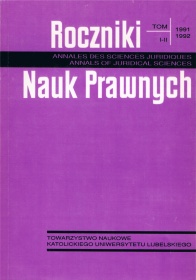The Constitutional Principles of the State−Church Relations (Art. 16 of the Polish Constitution Draft)
Abstract
The subject matter of the present paper is art. 16 of the Polish Constitution Draft in the version which gained acceptance on the part of the majority of the members of the Constitutional Commission of the National Assembly at the sitting held on April 4, 1995.
At the beginning the author states that setting the constitutional wordings on the State-Church relation in Poland under system transformations is a difficult and complicated task. These difficulties result above all from a discrepancy between ideological assumptions, with which post-communist parties approach to the Church, and the standpoint of the Polish Episcopate in this matter. Political parties, which as a result of the previous election gained majority in the parliament, and at the same time in the Constitutional Commission, draw on the communist or extremely liberal ideology. On the other hand, the Polish Episcopate postulate to include in the Constitution the principles which respect the identity of Polish culture and do not diverge from the solutions accepted in the constitutions of the contemporary democratic European states and are in line with the teaching of the Vatican Council.
Art. 16, being a result of compromise, in its version accepted by the majority of the Constitutional Commission, entails the following principles:
1) the principle of equality of rights for churches and religious associations,
2) the principle of impartiality of the state authorities towards religious, philosophical and philosophy-of-life beliefs, while safeguarding a possibility to express them in public life,
3) the principle of respect for the autonomy and independence of the State as well as Churches and religious associations, each in its own sphere, and their cooperation for te good of man and the common good,
4) the principle of regulation of the bilateral relations between the State and the Church by way of agreements; at the same time, the relations between the State and the Catholic Church are to be regulated in the form of an international convention with the Apostolic See, whereas the relations between the State and other churches and religious association are regulated in the form of a law passed after an agreement with their appropriate representatives.
On establishing the above principles the principles included in point 2 and 3 aroused most controversy. The representatives of political parties sharing post-communist or extremely liberal views sought to write down formulations stating "separation between the Church and the State", "secular character of the State" or "neutral philosophy of life of the State". They refused, however, to include a clear guarantee statuting that the relations between the State and the Catholic Church are to be grounded on the principle of respect for the autonomy an independence, and in the form of an international convention with the Apostolic See. Eventually, they accepted the principle that the regulation of bilateral relations between the State and the Catholic Church is to be grounded on an international convention. In place of the formulation stating neutrality of the State they introduced the formulation of "impartiality of the State authorities" towards "religious and philosophy-of-life beliefs". According to the author the formulation of "impartiality" is ambiguous. The problem of its importance may be an object of further controversies.
Copyright (c) 1995 Roczniki Nauk Prawnych

This work is licensed under a Creative Commons Attribution-NonCommercial-NoDerivatives 4.0 International License.


